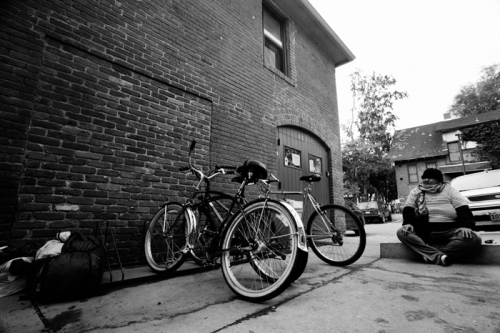News Briefs: No Camping: Rough Sleepers Get the Boot From Boulder
Published November 2009 Vol. 13 Issue 10
by Sarah Eckhoff
photo by Adrian Diubaldo
 A woman rests outside the Carriage House in Boulder.
A woman rests outside the Carriage House in Boulder.
Jon Garrett carries his home on his shoulders. Every night he hopes to find a place where he can lay his head away from biting wind or cold rain. And at least four times in his almost two-year stint of homelessness, he has been wakened by law enforcement ready to convict him for this illegal activity.
Boulder Revised Code 5-6-10, Camping or lodging on property without consent, states that “no person shall camp within any park, parkway, recreation area, open space, or other public property” without first obtaining permission from the owner, supervisory officer or city manager. This means that from sunset to one hour after sunrise, any person carrying out “daily activities” such as eating, sleeping or seeking protection from the elements in a way other than clothing can be arrested.
The ordinance has resulted in the issuance of hundreds of tickets for “illegal camping” each year, 356 of them in the past 10 months. Though an exact figure on how many tickets go to the homeless is unknown, advocates say these tickets are mostly doled out to homeless individuals who are unable to obtain shelter at night, causing some people to argue that this law criminalizes homelessness.
The Boulder Shelter for the Homeless is the only shelter in the city that allows admission to all men and women without requirement. It is also closed every year between April 30 and October 1, and this year it opened two weeks later because of budget issues. According to the 2009 Point-in-Time Survey, 1,050 homeless persons reside in Boulder County, but when filled to capacity, the Boulder Shelter can house only 160 overnight clients. Churches and other community organizations open shelter for overflow, but that only adds a maximum of 30 beds. Which begs the question: Where do these people go?
Joy Eckstine, executive director of the Carriage House, a daytime homeless service in Boulder, thinks the ordinance, which originated in 1968, is unfair, outdated and selectively enforced. Armed with a 127-signature petition and several letters of support, Eckstine brought a proposal to the city’s Human Relations Commission in September. She, along with dozens of homeless and supporters, advocated for a conversation regarding change to the city’s illegal camping ordinance.
No matter the date or purpose of origin, some think the law should be more specific. Terri Sternberg, a homeless woman that spent six days in jail for trespassing, feels the ordinance is too ambiguous. “There are actually more specific particulars in the ordinance addressing ‘use of projectiles on the mall’ by jugglers than there are for camping.” Sternberg said.
Earlier this summer, seven individuals were arrested for illegal camping when they were found sleeping for unknown reason on the roof of the Boulder Public Library. Many of the homeless that are being arrested for violation of this law, however, are doing everything they can to be discreet and clean up after themselves.
“Some people are even scared to take a brightly colored blanket because they don’t want to be seen by the police,” Eckstine said. “Clearly some people are drunk, but most people are doing everything they can to be unnoticed, unobtrusive, responsible.”
Some climb miles into the mountains to avoid citation or being disturbed by the police.
“I’ve actually had a cop kick my backpack four feet telling me to wake up. Can you imagine being asleep in your bed and waking up to that kind of stuff?” Jon Garrett asked.
Though Garrett’s experience may not be the norm, Boulder County police chief Mark Beckner told the Human Relations Commission that the police do have the right to confiscate and dispose of illegal camper’s possessions.
Last year, Boulder police issued 416 illegal camping tickets. Of those, only 47 individuals could pay the required $100 fee. The other 369 spent a total of 458 days in jail, costing the city a total of approximately $32,000 based on a $70 average cost for a night in jail. So far this year, 356 tickets have been issued and 224 days have been spent in jail for illegal camping.
“I try to change spots every night, but I’m not so lucky sometimes,” Garrett said.
“That’s why this law is a big deal,” Eckstine said. “There is no legal alternative. They have to break the law in order to survive.”
The city of Boulder is looking at the issue of illegal camping under the umbrella of homelessness in general, but they say a solution will take time. “It’s going to take some months, it’s not going to happen right away. There’s a lot of players, and all their input is important,” said Carmen Atilano, Administrator of the Office of Human Rights.
Money or jail time is not the only option for arrested people. Linda Cooke, presiding judge for the Boulder Municipal Court, says that in the cases she gets, she has given community service instead of a fine. So far, she has received about 80 percent compliance.
Other cities in the United States have passed legislation forbidding the conviction of homeless individuals for “sit and lie” laws, calling it a cruel and unusual punishment and a violation of the 8th amendment. In Jones vs. the city of Los Angeles, the judge ruled, “the state cannot punish a person for certain conditions or acts that he is powerless to avoid.” Sitting or lying down is an “unavoidable consequence of being homeless,” the Judge ruled.
